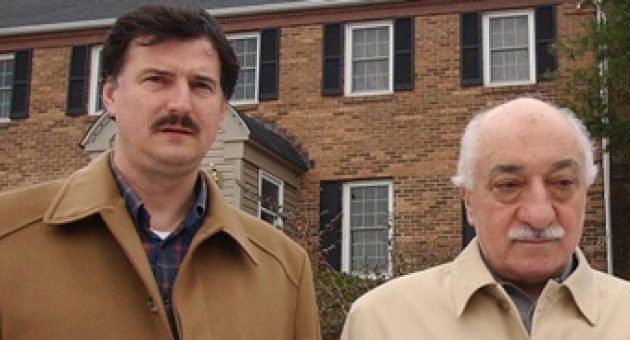Widespread distrust is stoking financial troubles for the new leaders of the Gülenist Terror Group (FETÖ) following the death of the group’s leader, Fetullah Gülen.
The group’s so-called executive board of 12 members took over the reins after Gülen’s death in Pennsylvania in October, but their squabbling is growing into a tumultuous power struggle for the one to succeed Gülen as the next FETÖ ringleader, according to Turkish security sources.
The terror group orchestrated the defeated coup of July 15, 2016, in Türkiye, in which 252 people were killed and 2,734 wounded. Ankara also accuses FETÖ of being behind a long-running campaign to overthrow the state through the infiltration of Turkish institutions, particularly the military, police and judiciary.
Türkiye has targeted its active members and sleeper cells nonstop and its influence has been much reduced since 2016, but the group maintains a vast network, including infiltrators suspected to be still operating within Turkish institutions.
The tensions among FETÖ seniors are spreading to the rank and file, dragging the organization to turmoil as members everywhere are increasingly divided between their favored candidates who each seeks to rule alone, sources said.
The 12-member “executive board,” including top profile names like Cevdet Türkyolu, who served as right-hand man to Gülen, and Abdullah Aymaz, who heads FETÖ’s network in Europe, was meant to balm the existing qualms and present a united front but the polarization within is being felt in waves.
Decisions currently steering FETÖ are seemingly taken by this “board,” but an exclusive in-group of six, led by Aymaz, is the one pulling the strings, sources said.
The cracks in leadership expose the delays in decision-making. The “executive board’s” decisions used to be made with Gülen’s final approval, but nowadays, each board member questions every decision.
Setbacks go deeper than delays as the uncertainties have spurred widespread distrust among members, which is causing problems with finding funds.
Security sources say Aymaz and his clique want to double the “himmet” rates. “Himmet” is the name FETÖ gave to donations to the group or cash obtained through extortion.
FETÖ has amassed a considerable fortune through donations, as well as a colossal business and school network in Türkiye and around the world. With Gülen’s death, the seniors are eager to claim the unattended wealth.
Security sources said that before his death, Gülen had wanted the “executive board” to be refreshed with younger members and people of other nationalities, but the 12 members have exploited the “transitional period” following his death to hold on to power.
One of the latest names to join the “board” was Ekrem Dumanlı, the chief editor of FETÖ’s now-closed newspaper Zaman, whose arrival was expected to increase participation but failed. FETÖ seniors think Dumanlı is of a weak profile and cannot keep a seat on the “board.”
Mustafa Özcan, considered a top lieutenant of Gülen in Türkiye, is also notably absent from the “executive board.” Özcan refrained from entering the “board” on the grounds that he would not have a strong hand against Aymaz and his crew’s influence.
The power struggle could ultimately lead to a standoff between Aymaz and Türkyolu.
Türkyolu, married to a niece of Gülen, had served as private secretary of Gülen in Pennsylvania, handling his daily affairs and visits by followers.

He also served as Gülen’s “coffer,” according to Turkish media reports, and controlled a fortune of millions of dollars. He also amassed a fortune in Türkiye, where he owned 39 properties in four cities. Like Özcan, Türkyolu was among the executives of the now-defunct Kaynak and is among the wanted figures of the terrorist group.
Türkyolu is accused by Gülen’s nephew Ebuseleme Gülen of stealing funds the group’s members sent for activities of the terrorist group and “making himself rich.”
In a streaming video that made waves among FETÖ members last summer, Ebuseleme Gülen claimed Türkyolu had been expelled a few times from the Pennsylvania compound and came back every time, convincing the group’s leadership of his innocence.
Mustafa Özcan is also said to have been involved in Türkyolu’s plots, including a conspiracy to “smuggle” Gülen out of his compound at one point in recent years to sever his ties with his followers.
Aymaz seeks to erode the influence of Türkyolu and Özcan within the group. Sources said he even threatened to establish a new FETÖ independent of those in the United States in Europe.
According to the sources, current infighting in the group can even lead to assassinations.
Aymaz counts among his supporters prominent figures of the group, including Mustafa Yeşil, Ali Ursavaş, Barbaros Kocakurt, Talip Büyük, Bilal Karaduman and Ismail Cingöz. Among Türkyolu and Özcan’s supporters are Ekrem Dumanlı, Adem Kalaç, Ismet Aksoy, Naci Tosun and Muhammed Çetin.
This year’s appointments of “country chiefs” within FETÖ, which would be determined by the “executive board,” are also a topic of debate among members, security sources said.
The “executive board” is also expected to change in February amid disputes between seniors to assign figures close to themselves, which could lead to an altercation at meetings.
36 suspects arrested
Meanwhile, in Türkiye, authorities arrested 36 of 63 suspects allegedly linked to FETÖ, Interior Minister Ali Yerlikaya announced Wednesday.
The suspects were detained in raids across 38 provinces and they are charged with being a member of a terrorist organization, providing funds to it, and spreading FETÖ propaganda on social media platforms, Yerlikaya said in a statement on X.
Two suspects were released on probation, while the others remain in detention.
“We will continue our fight until we eradicate this treacherous structure that attempted to seize our national willpower,” Yerlikaya said.


